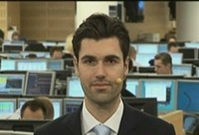
© Kasper Kirkegaard
|
How is Denmark's economy currently performing? To what extent has it been influenced by the Eurozone debt crisis?In general, Danish growth has been absent for several years now, and the recovery out of the 2008 financial crisis has been very sluggish. That said, Denmark still enjoys, just like the rest of Scandinavia's countries, very healthy balances, marginal budget deficit, low debt levels and a positive current account - that all has mattered more for the currency market than the growth outlook.
Central Bank Governor Nils Bernstein's policies have helped fuel borrowing as he has cut rates to unprecedented levels to protect the Krone's peg to the Euro. When the rates will begin to rise, do you think there might be troubles for economic growth, given that Danish private sector debt may curb private consumption.
Obviously, Denmark‘s economy has benefited from a low rate environment. However, one has to remember, that the primary objective of the Danish monetary policy is to secure the currency peg to the Euro and that is how the Danish central bank sets its monetary policy. Thus, the key objective is to sustain the peg. The policymakers do not conduct monetary policy in order to affect the economic growth. Hence, that is not an issue for the central bank.
Given the fact that Denmark twice rejected joining the Eurozone, do you think Denmark will become member of the Euro bloc sometime in the future?
At least what we can see from the current polls, which have been done in Denmark, is that currently there is no willingness to join the Eurozone. However, we cannot comment on whether that will change in the future or not.
What is your forecast USD/DDK for the end of January and for the end of the quarter?
For the end of January we have USD/DKK at 5.62 and for the end of the first quarter our forecast is 5.57.